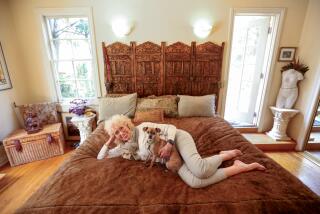Trademark Defense Comes Off the Wall
- Share via
The Murphy bed has fallen off the wall into the unprotected legal world of generic words. It landed in the same category as once-protected trademarks such as aspirin, thermos, escalator and nylon.
For those of you who don’t recognize the name, you may recall seeing a Murphy bed as the focus of slapstick comedians, such as Charlie Chaplin and the Marx Brothers. It is a bed concealed in a wall closet.
At the turn of the century, William Lawrence Murphy invented and manufactured the first such bed. In 1925, he incorporated in New York under the name Murphy Door Bed Co. and marketed the wall bed under the name Murphy Bed. That name became synonymous with the beds sold by the company. It was the company’s trademark.
A trademark is a word, graphic design, logo or symbol used to represent a particular product and protected by both state and federal law. The laws are meant to protect the “palming off” of one product for another and possible confusion about the source or manufacturer of a product. With a trademark, you’ve got the exclusive right to market a product under that name.
But your trademark can literally vanish into thin air if the name becomes generic--when it is commonly used to depict a type of product, rather than a particular product. In other words, if the public adopts or “expropriates” your trademark, you lose it, which means others will be able to use it.
In this case, decided in May, the Second Circuit U.S. Court of Appeals in New York determined that the public had adopted the term Murphy bed as a “synonym for any bed that folds into a closet,” not only as the name of the beds manufactured by the Murphy Door Bed Co. A lower court ruled earlier that the name had developed something lawyers call “secondary meaning”--”that the term symbolized a particular business, product or company,” but the appeals court overturned the decision.
The appeals court made its determination based on several factors. First, the U.S. Patent and Trademark office had denied an application to register the trademark because of its widespread generic use. (But that single factor is not determinative. You can still own a protectable trademark that has not been registered with the federal government.)
Second, the term Murphy bed is included in many dictionaries as a standard description of a wall bed, and finally, the court reviewed numerous examples where journalists used the phrase to describe wall beds generally. (That’s one reason why newspapers and magazines often receive threatening legal letters from manufacturers urging them to use generic names in conjunction with a product name; for example, Kleenex tissue or a Frisbee disc.)
If you are starting a business and want to create a protectable trademark, you should consult an experienced trademark lawyer. It is a highly specialized subject, and you don’t want to make a mistake.
Of course there is little you can do if the trademark you selected is so successful that it becomes widely known as the substitute for the entire line of products, not just yours. The creators of cellophane, shredded wheat and trampoline all discovered this--all of these are trademarks that fell into the public domain.
More to Read
Inside the business of entertainment
The Wide Shot brings you news, analysis and insights on everything from streaming wars to production — and what it all means for the future.
You may occasionally receive promotional content from the Los Angeles Times.








